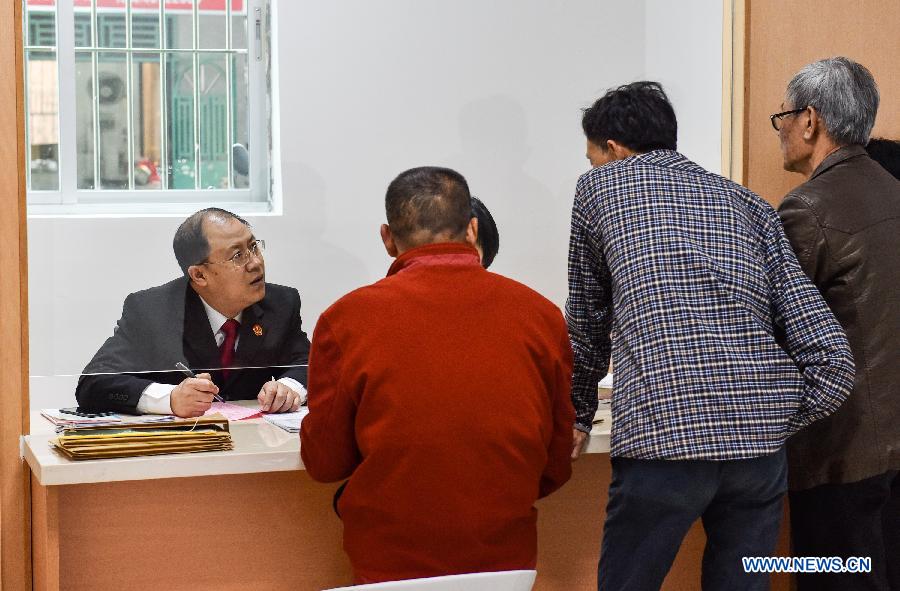Circuit courts ease pressure on system
 0 Comment(s)
0 Comment(s) Print
Print E-mail China Daily, February 3, 2015
E-mail China Daily, February 3, 2015
East and West are never quite the same. In English, people used to say, "the King has long arms", while in Chinese, people say, "The sky is high, the emperor far away", meaning the government's power diminishes in distant corners of the country.
 |
|
A judge (1st L) of China's Supreme People's Court first circuit court receives claimants at the reception room in Shenzhen, south China's Guangdong Province, Feb. 2, 2015. The first circuit court of China's Supreme People's Court (SPC) began to hear cases officially Monday in Shenzhen. (Xinhua/Mao Siqian) |
When you look at all the people lining up every morning in front of some central government offices to file their appeals and submit their complaints, you know how true the ancient saying remains.
Staff members at the Supreme People's Court say that, thanks in part to growing awareness of the rule of law among citizens, they have been overloaded with local appeals for the last few years.
The number of cases that the country's highest court handles annually exceeded 10,000 in 2010 and rose to a record high of 14,000 in 2014.
A majority of the cases are from the economically more developed coastal areas in East China. Now the Supreme People's Court has opened the country's first two circuit courts as its regional extensions, according to a guideline issued on Wednesday.
More convenient service
The move, which will ease the pressure on the top court, is part of judicial reforms designed to prevent local governments from interfering in cases and provide a more convenient service for litigants.
The first circuit court is based in Shenzhen, a business hub adjacent to Hong Kong and a service center for all the other cities in the Pearl River Delta, a key industrial base.
The Shenzhen circuit court is responsible for hearing administrative, civil and commercial disputes in the provinces of Guangdong, of which the Pearl River Delta forms only a part, and Hainan, and the Guangxi Zhuang autonomous region, said Sun Jungong, the top court's spokesman.
The second circuit court is in Shenyang and will serve cases from Heilongjiang, Liaoning and Jilin provinces. It will focus in particular on disputes arising from the painstaking economic transition in the nation's traditional industrial base, Sun said.
The new courts are expected to help relieve the top court from its heavy workload, and ensure independent and unbiased hearings.
However, the Supreme People's Court says cases relating to intellectual property rights, maritime matters, foreigners, executions and claims for State compensation will still be handed by the top court's head office in Beijing.
Judges are appointed
Both circuit courts started accepting cases at the beginning of the month, according to Chinese media reports.
There are at present no plans to open more circuit courts, according to sources at the Supreme People's Court.
Bi Yuqian, director of the civil procedure law research institute under the China University of Political Science and Law, said the move is just the first step in the efforts to press forward with judicial reform.
To staff the new courts, the Supreme People's Court has selected 88 judicial officials, including two chief judges, four deputy judges, 18 senior judges - six of them female - and 20 court clerks, according to a statement by the top justice authority.
Liu Guixiang, 52, the chief judge of Shenzhen circuit court, said all the judges have more than 15 years' experience in hearing cases and have made no mistakes in their work.
His court has its own courtrooms, but judges will be able to travel to areas where disputes arise if necessary.
"For example, we'll go to Hainan or Guangxi and make use of a courtroom in a local high people's court or intermediate court to hear a case," said Liu.
"This will reduce travel expenses and the cost of lawsuits for litigants."
The circuit courts' judges, along with their properties and facilities, are governed by the top court. Their judicial staff members are to be rotated every two years, Liu said, in order to "avoid conflicts of interests".
There will also be disciplinary inspectors to supervise the courts, he added.
"Judges are required to take responsibility for their cases and will be blamed if there are judicial mistakes, said Liu.
"We want to shorten the time spent on cases and reduce opportunities for regional protectionism."
Hu Yunteng, the chief judge at Shenyang circuit court, said high-quality verdicts will be issued regularly to guide grassroots courts on how to to handle similar cases.
The new courts will benefit from the experience they gain in handling cross-regional disputes, he added.
The initiative has been welcomed by Cui Dezhong, a farmer who has been traveling to Beijing for years to petition over the alleged unjust treatment of his son by a local authority.
The circuit courts will now take over responsibility for cases involving petitions.
"The Shenyang court will save me time and money, I'll go there at once," Xinhua News Agency quoted Cui as saying.
Bi welcomed the creation of the new courts, but said the way they work will only become clear over time.
"Regional courts rely on local governments as their source of finance," he said. "Ensuring their independence is a must to maintain the fairness of their judicial procedures. Interference is most severe at intermediate people's courts."
A number of amendments to the law and the Constitution will be required to ensure the circuit courts operate well, he added.






Go to Forum >>0 Comment(s)